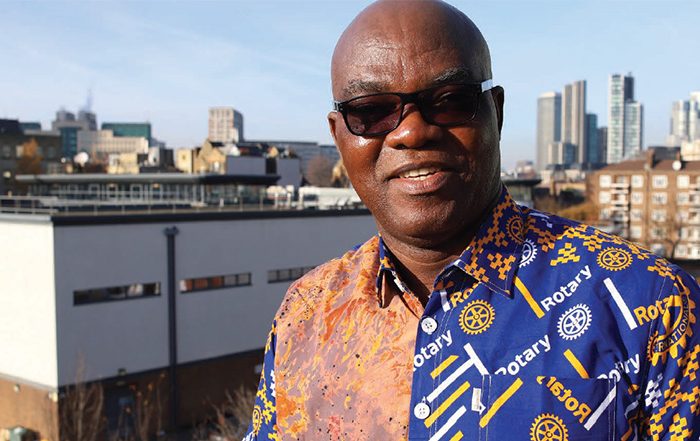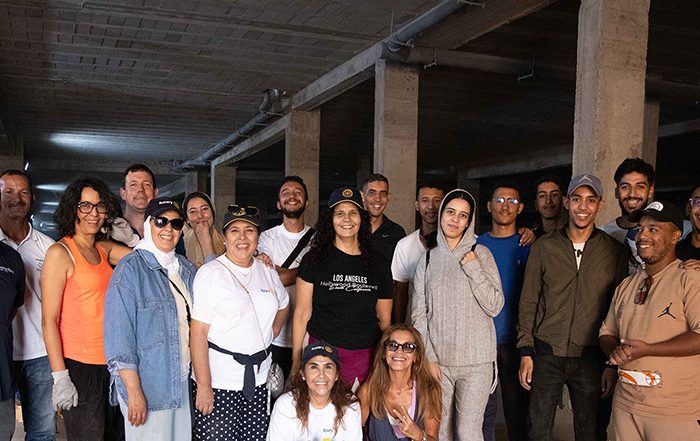We were very fortunate to have volunteers from both the Rotary Club of Redruth and Helston Cober Valley at our recent pre-deployment training.
This training is mandatory for any ShelterBox personnel involved in our responses before they travel overseas. The week-long course includes learning about our response procedures and project cycle and involves scenarios based on teamwork and problem solving in crisis situations.
An element of this vital training is to prepare personnel for any first aid situations that they might find themselves in whilst on deployment. It includes some gritty first aid scenarios where we rely on volunteers to make the situations as life-like as possible.

Brian Barber is one of the Rotary members from the Rotary Club of Redruth who gave their time to help with part of our first aid component of the training. Read in Brian’s words about his experience of volunteering.
Brian’s experience
“Recently, President Elect Stella and I volunteered as casualties on the first aid element of a ShelterBox pre-deployment training day, which took place around water filled quarries near Penryn that is home to BF Adventure.
“We arrived in the morning at the on-site café to meet the trainers and other ‘casualties’. There over coffee, we were rather overawed to learn that four of the others playing the role were semi-professional casualties. They had done this many times before and were volunteers with Casualties Union, a registered charity that provides acting and reacting casualties and patients for the medical profession, emergency services and those teaching first aid, nursing and rescue. They were also actors in local amateur dramatics.
“Here we met our ShelterBox trainers and security personnel, received our health and safety briefing, and were given an overview of the day’s activities. At this stage, and for reasons which we learned later, the trainees themselves were elsewhere and hidden from us.

“From the café, we walked around the site to see the four locations that would be used for the later disaster-training exercises. We learned that the pre-deployment trainees would be split into groups, as would the casualties, so each group would get the chance to work with each other before taking part in a final all together exercise.
“We then proceeded to a covered area, where over lunch we met other casualties, including ShelterBox employees and a couple of students from the University of Falmouth, who were studying drama. Here we were told more about the simulated disasters and our roles. We were each made up with fake blood and theatrical makeup befitting the roles we were to play. At this point it was clarified that the pre-deployment trainees were ‘hidden’ as they should not get a preview of our injuries.
“Stella and I were not seriously injured and but were told to play a specific role to make the scenario as realistic as possible for the trainees (we can’t give too much away as we don’t want to affect future training scenarios).
“At last we were ready to start and each group of casualties proceeded to their assigned disaster location. Stella and I were to be injured in a car crash following a disaster, this is one of the biggest risks faced by all humanitarian aid workers. I sat in the car with Stella and a third casualty. A pedestrian caught up in the crash, she had sustained a nasty injury and was trapped under the car.
“The trainees arrived, assessed the situation and began their rescue and treatment. After about 20 minutes the trainer called a halt and began the review of what had happened. As it was their first exercise, some errors were to be expected; so armed with that experience and some advice from the trainer, the casualties assumed their positions again, and we restarted with the second group.
“This run-through went more smoothly. By now Stella and I were really getting into it, playing to our roles even more and being quite dramatic. But, of course, the trainees also had the experience of their first exercise under their belts. After a quick triage, they ignored us to some extent while they dealt with the more seriously injured. Twenty minutes of action followed by the review, and we now assumed our positions again for the third group of trainees.

“I was now very much into my role, and as a car driver, I decided that blowing the car’s horn might be a good way to attract the trainees’ attention. I completely forgot the pedestrian casualty was lying under the front of my car. When we were called to stop after 20 minutes, she was not best pleased and slightly deaf!
“After the review we re-grouped ready for the final, larger disaster, which would include all casualties and the three groups of trainees. Cars again, but a more severe incident which took more decision making and skill to deal with. I was again a driver, and was injured, complaining of chest pains. I was initially diagnosed as having a heart attack, but as the defibrillator approached and the leads attached, the trainees had a rethink and correctly diagnosed my injury before shocking me.
“The day ended with the final exercise review and we all said our goodbyes and headed home.
As a final test of the skills of the makeup artist, Stella and I attended our Rotary Club meeting without removing our makeup. Everyone showed concern and asked how our injuries had been sustained!
“It was a very enjoyable and fun day. Both casualties and trainees had moments when surpassing laughter was difficult, but overall it was evident that the trainees increased in skills and confidence as the day progressed. We would certainly do it again.”
Become a ShelterBox Ambassador

We rely on volunteers from Rotary and other walks of life for so much of our work at home in raising awareness and funds and helping with staff development such as our pre-deployment training. Rotary volunteers are equally important abroad, in supporting our responses by providing local knowledge, vital networking and logistics contacts.
We’re currently looking for more Volunteer Ambassadors to join our wonderful network across the UK and Ireland.
Find out more



